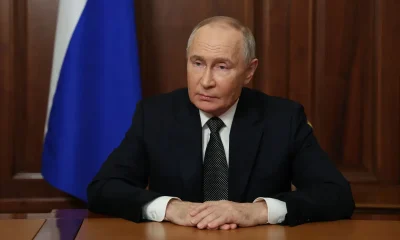International
EU: Ukraine Refuses To Accept the Price Cap Set On Russian Oil Exports

Ukraine President Volodymyr Zelensky has criticised a price cap set by his Western allies on Russian oil exports, calling it “weak.”
Eko Hot Blog reports that the cap, approved on Friday, is aimed at stopping countries from paying more than $60 (£48) for a barrel of seaborne Russian crude oil.
EDITOR’S PICKS
-
Biden Calls Putin’s Actions In Ukraine “Sick”
-
US Approves $380 Million Missile Sale To Finland
-
Former VC Of Federal University Gusau Sentenced To 35 Years
Russia says it will not accept a cap on prices for its oil exports.
The measure – due to come into force on Monday – intensifies Western pressure on Russia over the invasion.
But Mr Zelensky called the price cap “a weak position” and not “serious” enough to damage the Russian economy.
“Russia has already caused huge losses to all countries of the world by deliberately destabilising the energy market,” he said in his nightly address.
It is “only a matter of time when stronger tools will have to be used,” he added.
The price cap was put forward in September by the G7 group of industrialised nations (the US, Canada, the UK, France, Germany, Italy, Japan, and the EU) in a bid to hit Moscow’s ability to finance the war in Ukraine.
In a joint statement, the G7, the EU, and Australia said the decision was taken to “prevent Russia from profiting from its war of aggression against Ukraine.”
On Saturday, Kremlin spokesman Dmitry Peskov said that Moscow had prepared for the move but would “not accept” the cap.
Though the measures will most certainly be felt by Russia, the blow will be partially softened by its move to sell its oil to other markets, such as India and China – which are currently the largest single buyers of Russian crude oil.
The agreement of a price cap comes just days before an EU-wide ban on Russian crude oil imported by the sea comes into force, also on 5 December.
The price cap – which is meant to affect oil exports worldwide – is meant to complement that.
Countries that sign up for the G7-led policy will only be permitted to purchase oil and petroleum products transported via sea that are sold at or below the price cap.
Ukraine’s Western allies also plan to deny insurance to tankers delivering Russian oil to countries that do not stick to the price cap. This will make it hard for Russia to sell oil above that price.
Before the war, in 2021, more than half of Russia’s oil exports went to Europe, according to the International Energy Association. Germany was the largest importer, followed by the Netherlands and Poland.
FURTHER READING
-
Musician Jake Flint Dies Just Hours After His Wedding
-
India Diaspora Remits Record Breaking $100 Billion- World Bank
-
San Francisco To Allow Police Use Killer Robots
But since the war, EU countries have been desperately trying to decrease their dependency. The US has already banned Russian crude oil, while the UK plans to phase it out by the end of the year.
Source: BBC
Click here to watch our video of the week:
Advertise or Publish a Story on EkoHot Blog:
Kindly contact us at [email protected]. Breaking stories should be sent to the above email and substantiated with pictorial evidence.
Citizen journalists will receive a token as data incentive.
Call or Whatsapp: 0803 561 7233, 0703 414 5611














